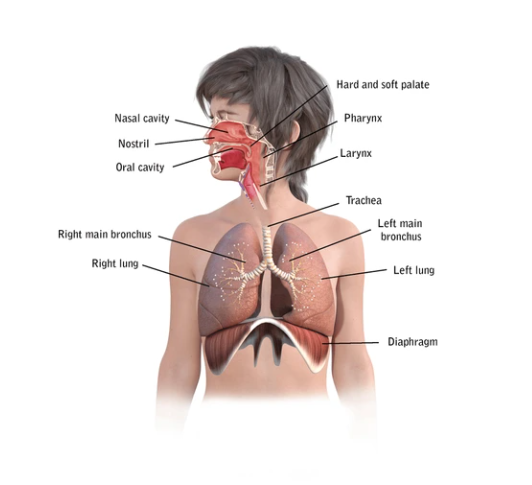Pregnancy brings significant physiological changes, including alterations in the respiratory system. While many respiratory issues are common and manageable, some disorders require careful attention to ensure both maternal and fetal health. Here’s an overview of common respiratory disorders during pregnancy, their causes, symptoms, and management strategies.
Asthma
- Definition and Causes:
- Asthma is a chronic condition characterized by inflammation and narrowing of the airways, leading to breathing difficulties. During pregnancy, hormonal changes and increased blood volume can affect asthma symptoms. Some women may experience worsening of their condition, while others may find improvement.
- Symptoms:
- Wheezing: A high-pitched whistling sound when exhaling.
- Shortness of Breath: Difficulty breathing or feeling breathless.
- Chest Tightness: A feeling of pressure or tightness in the chest.
- Coughing: Persistent cough, especially at night or early in the morning.
- Management and Treatment:
- Medication: Continue using prescribed asthma medications as directed. Inhaled corticosteroids and bronchodilators are commonly used and generally safe during pregnancy.
- Monitoring: Regular check-ups with your healthcare provider to monitor asthma control and adjust medication if necessary.
- Avoid Triggers: Identify and avoid asthma triggers, such as allergens, smoke, or respiratory infections.
Chronic Obstructive Pulmonary Disease (COPD)
- Definition and Causes:
- COPD is a group of progressive lung diseases, including emphysema and chronic bronchitis, characterized by long-term breathing problems and poor airflow. Pregnant women with COPD may face additional challenges due to increased oxygen demand and changes in lung function.
- Symptoms:
- Persistent Cough: Chronic cough that may produce mucus.
- Shortness of Breath: Difficulty breathing, especially with exertion.
- Wheezing: A whistling sound when breathing.
- Fatigue: Feeling unusually tired due to decreased oxygen levels.
- Management and Treatment:
- Medication: Use COPD medications as prescribed, including bronchodilators and corticosteroids. Consult your healthcare provider for adjustments during pregnancy.
- Oxygen Therapy: May be required if oxygen levels are low.
- Lifestyle Changes: Avoid exposure to respiratory irritants and ensure a smoke-free environment.
Pneumonia
- Definition and Causes:
- Pneumonia is an infection of the lungs that can be caused by bacteria, viruses, or fungi. During pregnancy, pneumonia can lead to complications if not promptly treated, including preterm labor or low birth weight.
- Symptoms:
- Cough: Persistent cough that may be accompanied by mucus or pus.
- Fever: Elevated body temperature.
- Chest Pain: Sharp or stabbing pain that worsens with breathing or coughing.
- Shortness of Breath: Difficulty breathing or rapid breathing.
- Management and Treatment:
- Antibiotics: If caused by bacteria, antibiotics may be prescribed. Always consult with your healthcare provider to ensure safe medication use during pregnancy.
- Rest and Hydration: Adequate rest and fluids can help support recovery.
- Hospitalization: Severe cases may require hospitalization for intravenous antibiotics and supportive care.

Pulmonary Embolism
- Definition and Causes:
- A pulmonary embolism occurs when a blood clot travels to the lungs, blocking a blood vessel. It is a serious condition that can be life-threatening and is more common in pregnancy due to increased blood clotting tendencies.
- Symptoms:
- Shortness of Breath: Sudden or worsening difficulty breathing.
- Chest Pain: Sharp or stabbing pain that may worsen with breathing.
- Coughing: May include coughing up blood.
- Swelling: Swelling in the legs or thighs, which may indicate a blood clot in the deep veins.
- Management and Treatment:
- Anticoagulants: Blood thinners may be prescribed to prevent further clotting. Always follow your healthcare provider’s instructions regarding medication.
- Emergency Care: Immediate medical attention is required if a pulmonary embolism is suspected. Treatment may involve hospitalization and supportive care.
Sleep Apnea
- Definition and Causes:
- Sleep apnea is a condition where breathing repeatedly stops and starts during sleep. Pregnancy can exacerbate sleep apnea due to weight gain and changes in respiratory mechanics.
- Symptoms:
- Loud Snoring: Excessive snoring that may disturb sleep.
- Excessive Daytime Sleepiness: Feeling unusually tired during the day.
- Breathing Pauses: Pauses in breathing during sleep, often observed by a partner.
- Frequent Waking: Waking up frequently during the night.
- Management and Treatment:
- Lifestyle Changes: Maintain a healthy weight and sleep on your side rather than your back.
- Continuous Positive Airway Pressure (CPAP): A CPAP machine may be recommended to keep the airway open during sleep.
- Regular Monitoring: Frequent check-ups with your healthcare provider to manage symptoms and ensure proper treatment.
Conclusion: Disorders of the respiratory system during pregnancy require careful management to ensure the health and safety of both mother and baby. Regular prenatal care, timely diagnosis, and appropriate treatment are essential. If you experience symptoms such as severe shortness of breath, persistent cough, or chest pain, consult your healthcare provider promptly. By working closely with your healthcare team, you can manage these conditions effectively and support a healthy pregnancy.
